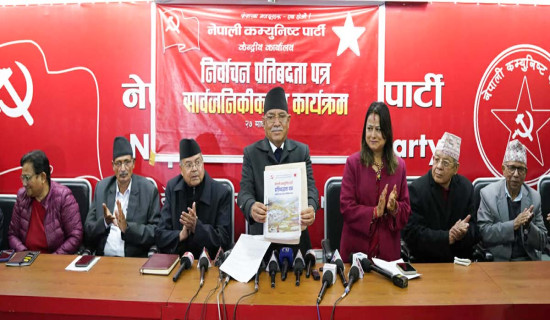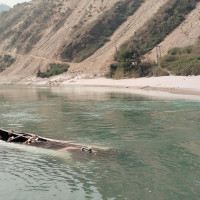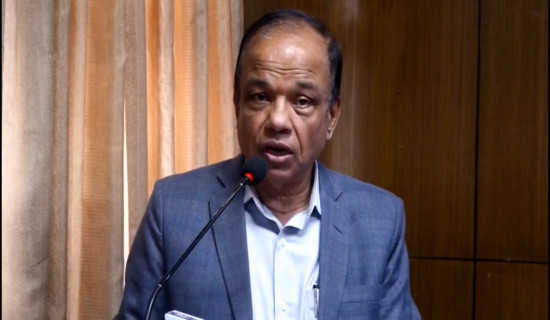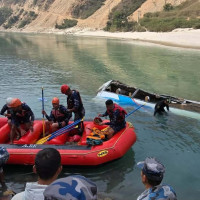- Wednesday, 11 February 2026
Active Citizenship Creates Responsive State
The Nepali constitution articulates that state sovereignty lies with the people. It has an egalitarian aspiration for the transformation of society. Popular sovereignty means Nepalis do not have to hold elections to legitimise their sovereignty, like state sovereignty in international relations. Without a sovereign state, people are back to the state of nature, while without popular sovereignty, the government may slip into an authoritarian penchant to cripple the freedom of people and social order held together by norms, values, and rituals. Popular sovereignty cannot be subordinated to market power, allowing only consumer choice, class power to wither away the state or delegated to any leadership of a political party or group of persons constituted as civil society.
Polity, government, political parties, civil society, business and intermediary bodies can legitimise their actions through periodic elections, public opinion and constitutional mandate. This shows that Nepali people cannot tear, isolate and trim down their sovereignty. It is enduring in nature. Awareness about this can democratise social, economic and political life and perfect itself, the state and all intermediary institutions in-between for a just peace. Nepalis must be accountable to their sane use, perform constitutional duties such as protecting the state and public property, paying taxes, participating in elections and public affairs and making the governance transparent for a just rule.
Awakened human beings
Nepal’s classical treatises deem the aim of education to produce awakened human beings, Jagruk Manushya, capable of knowing the purpose of life and assume matching duties, not passive ones succumbed to doctrinaire snooze. Popular sovereignty promises Nepalis an autonomous subject, conscious of the consequences of their action. They are not an object of media and political manipulation for instrumental action of dehumanisation — making them means of power, but a sphere of promoting virtuous ties. Nepal’s constitutional tradition has entrenched a system of checks and balances to safeguard the rights and freedoms of Nepalis. They are the source of political authority and the practical art of governance.
Nepali state’s capacity in taxation, adjudication of justice, loyalty of people and international recognition spur the coherence of territory, economy, population and nationality. A strong state is embedded in society, autonomous of the powerful interest groups and acts impersonally as per the constitutional vision. Nepalis are required to balance among their obligations to the state, humanitarian duties arising out of the nation’s membership in various international regimes and social contracts about climate change, gender, minorities, human rights, dignity of labour, wellbeing of people, etc. The International duty of the Nepali state obliges it to protect welfare provisions.
Links of Nepal’s social movements to global social movements have brought universal rights of Nepalis into the constitutional and policy spheres and made the domestic sphere of welfare essentially contested and hence requiring basic reforms as per the zeitgeist. Nepal has linked citizenship with social justice, social security and social protection and several entitlements, assuming that legal equality is deficient for the equality of life-choices in social, economic and political spheres. But the leadership political culture is paternalistic, patronage-based and markedly partisan and, therefore, inept to perform impartially in the general interests.
Elites from the parliament and the courts often talk about their own institutional sovereignty and independence, oblivious of the fact that the former has only delegated sovereignty for a period, while the latter acquires legitimacy of autonomy under the constitutional provision of the separation of powers. Nepali media often question their integrity and fairness. This tendency flips the sovereignty of Nepalis to articulate, organize and effect public action to consolidate the state-people interface.
Human rights and popular sovereignty sometimes compete. But democracy is the contiguous polity affirming popular sovereignty. Modern rights focus on individual and private autonomy, like natural rights, while popular sovereignty reflects the general will of all demos, where private wills are abstracted. Popular sovereignty is exercised through the people’s power of legislation for self-governance, while human rights require consistency with international laws and humanitarian norms. Postmodern identity politics, pre-modern feudalism and the class-based approach of withering away of the state cut the ties of popular sovereignty with state sovereignty and create loops for predators to penetrate.
Critical theories deny that class power is the basic type of social inclusion and do not agree that the mode of production is the engine of societal progress. Jürgen Habermas has, therefore, shifted the narrative of the mode of production to a paradigm of communicative action. The paradigm of free and informed communication, conversation and debate constitutes a vibrant public sphere for mutual learning, reaching understanding among diverse actors, mediation of public policies and interests and resolution of conflicts. It becomes a site of popular sovereignty. The public sphere cannot be replaced by seminars, workshops, consultative meetings of experts and conferences of political parties where participation rests on formal invitation.
The socially conscious general public is excluded from their process, thus it lacks ownership of the outcome. By nature, political parties are partial associations with no authority to seize the national state and take over the polity because the will of the people is embedded in the state and they derive their constitutional rights on the basis of their membership, not the membership of political parties. This implies that buttressing state sovereignty and popular sovereignty in Nepal can create a virtuous loop and seamless coherence.
The right to information in the Nepali constitution is exactly inserted to control the malaises of the polity, a right crafted to make Nepalis better informed, form opinions and build civic competence in influencing public affairs. Popular sovereignty becomes a delusion if the state is overburdened with external aid, imports, debt, knowledge, policy and laws. Pervasive dependence cuts people’s choice in policy matters and is subject to the law of necessity. Only a strong state can offer security to people, keep discipline in society, foil external predation and deliver public goods. Execution of nihilism dents the sanity of tradition, culture and spiritualism, which is the spring of Nepal.
Fairness and equality in domestic and international politics are critical attributes to synchronise popular and state sovereignty. Taxation is employed by the Nepali state, aiming to redistribute income, fund public projects and institutions and subsidize education, health, infrastructure and social goods so that Nepalis do not have to leave the nation for survival needs. Popular sovereignty means power should spring from the bottom up and legitimacy is derived through elections, tradition and constitutional laws. The criterion for determining popular sovereignty is the people’s control over politics, laws and public policies and their desire to regulate foreign policy.
In Nepal, however, these criteria are relativised. The classical Nepali treatises treat people as Janata Janardan, a divine being, and the decision-making process involved public consultation and debate. The modern popularizer of popular sovereignty is J. J. Rousseau, who believed that the general will invested the whole people with sovereignty and allied sovereignty with social and political equality. But the institution of private property has allowed Nepalis to fight for the distribution of resources. The system of property rights without limits and parliamentary exemption of tax for powerful businessmen to subsidize political parties’ electoral campaigns can only justify the power of wealthy and organized interest groups of society.
It demoralises the power of sovereign people who constitute a source of legitimacy and rationality of public action. The primacy of liberty of the wealthy over the lives of the poor and weak achieves neither. Popular sovereignty frees Nepalis from primordial loyalties, prejudice, blind faith and feudalisation of the public sphere that dominates them. It equally envisages a vision of a decent life in harmony with co-citizens. It is difficult to achieve a decent life so long as the empirical division of Nepalis along caste, class, gender, ethnic, regional, political parties and professional lines does not provide them with social mobility, opportunity and scope for national collective action. Without effective socializing agencies and equal chance, it is difficult to turn unequal individuals and parochial groups into equal citizens able to discharge their duties.
The constitutional rights and duties are crucial to bind Nepalis with the national frame and bring them under the common rule of law. This implies that the constitution is a document of unity of people, not a division into differentiated citizens institutionalised by corresponding inclusive commissions to protect their sectoral rights, not universal human rights. A sense of equality and unity can moderate centrifugal passion and venture into nation-building. Practically, however, equality hardly seems the nearest hope.
Popular sovereignty
In Nepal, popular sovereignty requires active citizenship able to exercise their public autonomy in elections, local self-governance, political parties, civil society and public affairs, hold the political power accountable to the public and serve as self-constituting and self-learning beings capable of using rational faculties for collective self-determination. Sovereignty of people is coterminous with participatory democracy where the principles of subsidiarity and the principle of affected are legitimised in governance. The free will of Nepalis, rooted in their sovereignty, helps the moralisation of political parties and public institutions of governance and sets the primacy of public reason, justice and morality over legal ones.
Sub-national struggle for separate identity and multi-national solidarity weakens the efficacy of citizens and their self-realization. In such a context, the Westphalian state cannot defend national interests in an apt way. The lifting of Nepal into a post-Westphalian state is vital. It synchronizes constitutional rights and interests of diverse people with the state sovereignty, expected to protect and represent them and enable them to exercise their popular sovereignty in consonance with the state’s imperatives.
(Former Reader at the Department of Political Science, TU, Dahal writes on political and social issues.)





-square-thumb.jpg)


-square-thumb.jpg)








